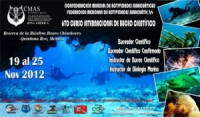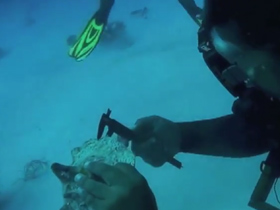Report of the 6th International Course of Scientific Diving
World Confederation of Underwater Activities Zone America
Mexican Federation of Underwater Activities
6th International Course of Scientific Diving
FMAS-CMAS Zone America
With the participation of Mexican and Cuban professionals and researchers, took place the 6th International Course of Scientific Diving FMAS-CMAS Zone America, at the Reserva de la Biósfera de Banco Chinchorro in Quintana Roo México, one of the most pristine sites of the Mesoamerican reef, satisfying the expectations of the participants and the directives of the Mexican and Cuban Federations of Underwater Activities.
The course was developed with the collaboration of the Reserva de la Biósfera de Banco Chinchorro and Parque Nacional Arrecifes de Xcalak, through the Nacional Commission of Protected Natural Areas in México (CONANP) from 19 to 25 of November 2012 in Quintana Roo México, with a teaching load of 50 hours.
The inauguration of the event, took place under the direction of the CISD María del Carmen García Rivas, Director of the RBBCH and PNAXand CISD Ma. Clotilde Zeckua Ramos Director of the FMAS y CMAS Zona América Scientific Committee. They offered the course’s participants, a week of collaborative work, and exchange of work methodology in the different areas of the science.
During the development of the course, the applicants for the different degrees, made presentations concerning Biology, Oceanography, and Underwater Photography. The work started with the presentations of the CMAS and the degrees of Scientific Diving, as well as the handling and conservation of the Protected Natural Areas of the Reserva de la Biósfera de Banco Chinchorro, by the course’s Directors. Afterward, the discussed topics were: “Use of the GPS for the localization of work areas to evaluate benthic communities” and “Alternative methods for Oceanographic measurements” by ISD Francisco Uribe Osorio, a researcher of the INAPESCA (CRIP-Ensenada), “Handling and control of the Lionfish in Cuba” and “Tips for underwater and land photography and how to select correctly the different lenses, depending on the work to be done” by the biologist Víctor M. Isla Lara, researcher and photographer of the National Aquarium of Cuba, “Handling and conservation of the queen conch and the Lionfish in the RBBCH” by the biologist Mateo Sabido Itzá, researcher of the Reserva RBBCH Y PNAX, “Technical information about the handling and evaluation of the chocolate clam in the Estero de San José and Laguna Manuela in Baja California” by Ulises Uribe González, specialist in the benthicresources and researcher of INAPESCA (CRIP-Ensenada), and ”Environmental Education Programs for the Communities” by the Biologist Sara Fuentes, from Friends of Sian Ka´an.
The course was enriched by the presentation of the program of Eradication of exotic mammals in the RBBCH, by the Group for Ecology and Conservation of Islas A.C.
The field work was developed on the base of the presentation topics, performing the operative planning with the assignment of working groups, scuba diving zones, preparation of equipment and vessel, as well as safety procedures for the performing of the correspondent practices in land and later in the underwater field, to conclude with the processing of the obtained data.
The applicants of the participant Countries obtained the following degrees:
|
|
Name |
Country |
Obtained Degree |
|
1 |
Mateo Sabido Itzá |
México |
Scientific Scuba Diver |
|
2 |
Sara Fuentes de la Peña |
México |
Scientific Scuba Diver |
|
3 |
Ulises Francisco Uribe González |
México |
Confirmed Scientific Scuba Diver |
|
4 |
Víctor Medardo Isla Lara |
Cuba |
Scientific Scuba Diver Instructor |
|
5 |
Francisco Uribe Osorio |
México |
Oceanography instructor |
|
6 |
Víctor Medardo Isla Lara |
Cuba |
Marine Biology Instructor |
|
7 |
Omar Gutiérrez Zeckua |
México |
Marine Biology Specialty |
The continuous development of instructors and scientific scuba divers in Mexico and Latin America, to achieve the professionalization of all those researchers who use scuba diving as a tool in the underwater scientific research, is, undoubtedly, one of the Mexican Federation priorities.
The Scientific Committee of CMAS Zone America joins again with specialists from the different areas of Science and reaffirms its commitment to permeate the work and facilitate to the conforming Federations, the necessary guidance to achieve the certification of the professionals that participate in the multidisciplinary scientific teams, for the performance of the projects in the different underwater disciplines.
Sincerely
“Salvemos nuestros mares”
CISD Ma. Clotilde Zeckua Ramos
Scientific Committee Director
FMAS/CMAS Zone America


























